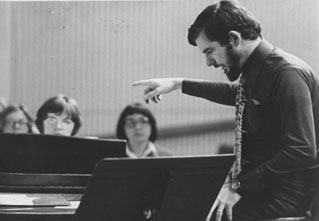Bear with me…this is going to be a multi-part post…and today is the setup that you’ll need to capitalize on what comes next…
What do you do?
No…really…
Leaving aside the full-time versus part-time (aka “bi-vocational”) part of serving a church in music or worship ministry…and also one of my favorite rant topics — whether or not you are compensated fairly for what you do — what do you do?
I once did a “time and motion” study (keeping track of everything — and I mean everything – I did) for a particularly controlling pastor, and I think it was more instructive to me than either he or the personnel committee. It was also more than they bargained for. Once they (and I) saw that I averaged 37 hours a week on campus — not including prep time at home – over the course of a year, in my “half time” job, they abandoned their attempts to not give me a raise on the basis of my schedule, and began to emphasize goal setting and evaluation on whether or not they were achieved. I had that one covered too, since I had grown the music ministry from about 13 adults and 6 kids plus one bell choir, to include about 150 people at the time this was going on (still didn’t get the raise though…the pastor’s oldest child was enrolling in college in September of the following year, and so none of the staff got raises so that his salary could be increased almost 20% in order to cover his new projected expenses…sigh…).
But I digress…
What do you do?
In my understanding of economics, almost all transactions are based upon trading one “thing” for another. Depending upon how shrewd a trader you are, you might participate in a one-sided transaction, but the old adage applies, assuming everyone adheres to the seventh commandment: there is no such thing as a free lunch.
Economics textbooks always use something called “widgets” as the “thing”…widgets being a generic name for a product. Trading a product/widget for something else is an easily understandable model. You make something (the widget) that I want. I give you something (bread, vegetables, flowers) in exchange. Both parties walk away happy. Substitute “zhu zhu pet” for the product and money for the something and you have a clear idea of what we’re talking about.
The world understands the product for cash model. But, for the third time, what do you do?
As a church musician or worship leader, do you “make” a “product?” I know that it has been fashionable to talk about the music/worship in church as a “product” but is it really? Can you hold it in your hand? Can you replicate it easily? If you trade it for something, can the person that gains it re-trade it for something else?
As job-description descendants of the tribe of Levi we share a unique calling, but also a serious problem…at least from the point of view of economics. As creative people, we are engaged in “making” what is now referred to as Intellectual Property (“IP” for short). There are two ironies here:
- for centuries the church (and the world) has been unable to figure out how to accurately value IP
- as the first world’s economies shift from making “products” to generating and controlling IP, what we do as church musicians is even more “valuable” while still being not fully understood by those who pay for our “output”
Tomorrow: New wine and the 1000 fan model. In the meantime, give some thought about what exactly you own personal IP is.












{ 5 trackbacks }
{ 6 comments… read them below or add one }
From my time starting out as a “Chuch Musician” my heart was to play for the Lord with the Talent he gave me. Still today that is my main reason for playing. In the early 1980′s I was given an opportunity to in apraise band if you wiil. I happened to be the drummmer. You know the one who palys the devils instrument. Many times I was scolded for playing too loud and for having drums in God’s House!! We kept on following the Lords directions and were blessed in many ways.
As the years past the drums became more and more acceptable and now they are common place. Mummurs still rumble some today. I was compensated for playing every weekend. This was a part time job since I have a 9-5 job during the week. As the church grew and the music ministry more and more time was required to keep the ministry going and the compensation for me increased as well. I have come to find out that this happens not to be the norm.
Today I still am involved in the “Worships Arts” ministry but devoting my time for free. I don’t seem to be getting the jabs for the church goers as much now. I believe that it is because since I do not recieve any compensation from them and therefore they may feel they have don’t have the right to say anything now.
There is something about working for the church in a paid position that seems to give the church members/ attenders the unwritten right to be judgemental/critical all in the name of the Lord.
My obeservation is do Christians/ Church members think that working for the church is not a “real Job” or even a career? Is that way most of the church staffs other than the Senior Pastor are under paid?
Looking for some insight on this…. Please advise
Thanks for the comment Pete. I’m not sure that church members think that church musicians and worship leaders don’t have a “real job” when they do ministry in a church situation. I do think that there are a whole layer of issues that affect the salaries of other staff: a layperson’s feeling that the pastor is the most important person in the church, a feeling among some that nobody should be compensated for their service to the church, a long-standing paradigm that no staff member should make as much as the person doing the giving, and many others. I’m not sure it will ever change. Check back tomorrow for the next post in the series.
Blessings,
vs
Pete–I thought you knew that musicians only work on Sunday mornings and the music just magically appears! I’ve served churches that felt that all music should be volunteered, yet they still wanted quatlity music. They didn’t see a reason that they’d have to pay for the expertise that comes with producing that quality. With the economy the way it is right now, churches are tightening the belts and what’s going? Music. One of the things they shouldn’t be scrimping on. When Aunt Minnie’s been at the console for 50 years, it shows, not only in quality, but I believe in the spaces left in the pews. This isn’t to say there aren’t some wonderful musicians in the church. I’ve had the privilege to serve with symphony-quality musicians in my congregation. But when you are paying someone to do that job, yes, you can demand more of them and in saying that, I open another Pandora’s box. It also leaves the paid musician open to abuse if they don’t watch themselves. I’m an overacheiver, so I do myself in! My 40 hour full time weeks in the church sometimes would end up 50 hours or more. I would often put in 14 hour days. But you are very correct when you say that some in the church don’t consider this a “job.” Music, to many, is a fun thing, so why should we pay for it and “can’t anyone do this, just wave their arms?” Believe me, in 35 years, I’ve seen it all, and from both sides. I’ve been part time, working full time hours and full time, going overtime and getting nothing for it. And all the while, being criticized along the way.
Shelley-
And we haven’t even begun to talk about the pastoral side of music/worship ministry. When I accepted a “missionary” position in a small church with the understanding that it would essentially be full time but I would be paid for part time, I was unprepared for the pastoral responsibilities’ drain on my creative time…
As a result of that experience, in which I ended up satisfying about 80% of the people but not one lay person who made all the decisions (especially after the pastor who hired me left…), I believe that part of the problem is heightened expectations, especially upon a small congregation that wants the “big church down the street” program, but won’t/can’t pay for it…
vs
I’ve been reading this series of posts with a mixture of amusement, and then disgust.
Let’s get the disgust out of the way: how can you possibly describe what a working church musician does as anything except SERVICE. Instead of comparison with the banking world, try a non-profit hospital, which is far more like a church than a bank is. What do you think the director of nursing, or a ward-manager, or a regular staff-nurse thinks they do: create IP? Or provide service, or enable other people to provide (better) service?
Moving on to the surprise.
Here are a couple of definitions of intellectual property:
“Intellectual property (IP) is a term referring to a number of distinct types of legal monopolies over creations of the mind, ” (source = Wikipedia)
“intangible property that is the result of creativity (such as patents or trademarks or copyrights) ” (souce = wordnetweb.princeton.edu/perl/webwn, via google).
There are many others , but the common factor is “creation”. Now, some working church musicians (paid and unpaid) do create: they write new tunes and/or new songs, or they write new arrangements of existing works. But, most of them, most of the time are simply “performing” existing works – the the same way that most directors-of-nursing aren’t creating new nursing approaches, they’re simply applying existing ones (researched by others) into their situations. Some working church musicians do create worship plans or orders-of-service (etc) but this planning is only a small part of the role, and by no means universal.
If you’re looking for an economic concept to help church musicians to understand their value, try “human capital” – which includes the knowledge and skills that educated musicians have, as well as their ability to harness these in a particular situation to help the organisation achieve its goals. Human capital isn’t measured in terms of what people DO: instead it picks up the idea of the potential that they bring to a position.
There ARE some great questions to be asked about intellectual property and church musicians. Eg, whose contract spells out rights to works that you compose while you’re working for a church? But they’re only partially related to how much a church musician is worth. (Unless future royalties are likely to be a substantial part of the church’s income – as they are for popular “mega-churches” that set up their own publishing houses, eg Hillsong)
Mary-
Thanks for the comment. I don’t think we are talking about different things here (well…I can’t vouch for the disgust part), because the point I was trying to make is that every church musician does contribute IP…even (or should I say especially) as part of the re-creative process.
The way I get to a particular result (through rehearsal, vision, compromise, exhortation, etc.) is my unique IP…it is not yours.
I have written elsewhere (http://dotdotdotblog.com/?p=101) about the high percentage of church musicians who have either been fired, or chosen to leave rather than be fired. My contention is that part of the reason for that high number is that the “style IP” (for lack of a better term) is often mis-understood by the very people who are charged with evaluating a creative person’s “work.” Recognizing that as IP, in my opinion, acknowledges that it is not like being a banker, or a nurse…it is like being a musician. And…just as bankers or nurses are the best judges of how other bankers or nurses do their service, so musicians are the best judge of how other musicians do their service.
Sorry if I was unclear…
blessings,
vs
You must log in to post a comment.